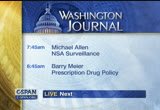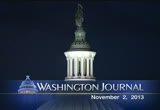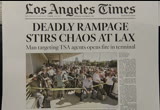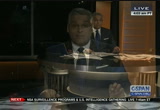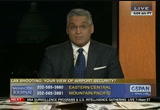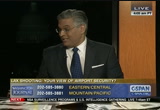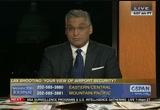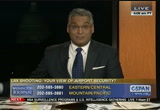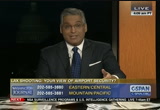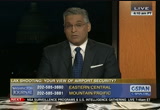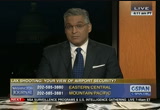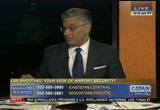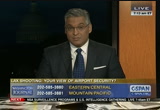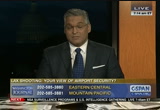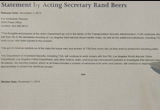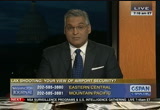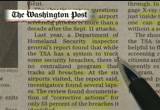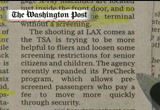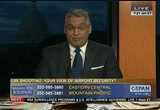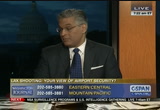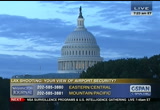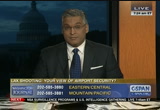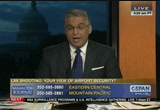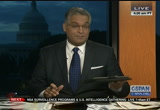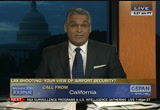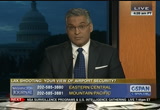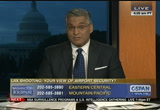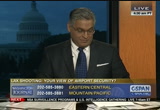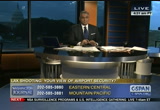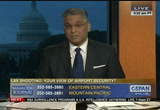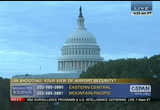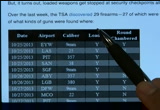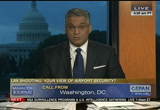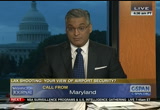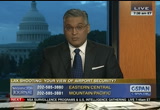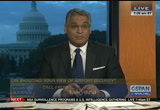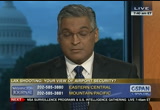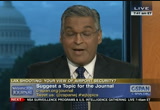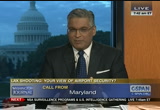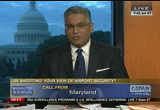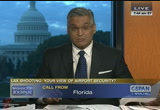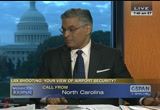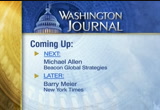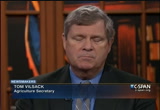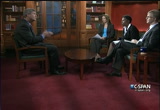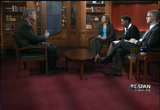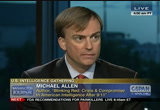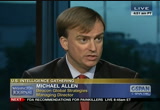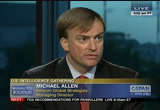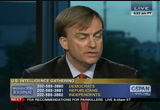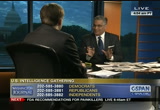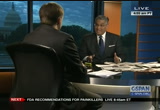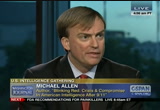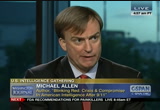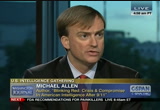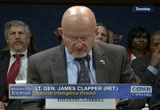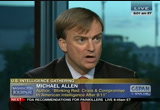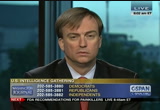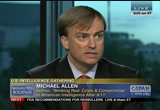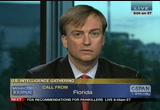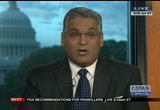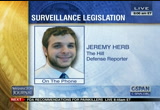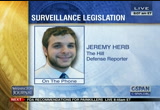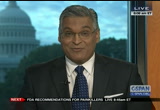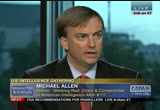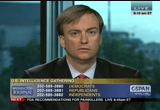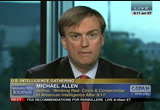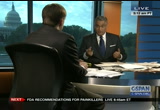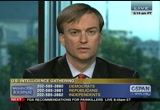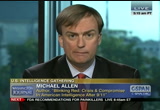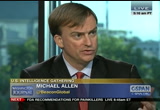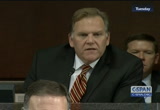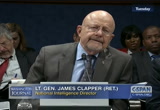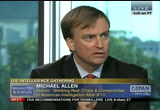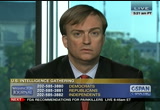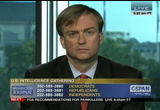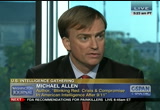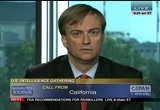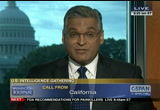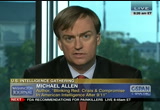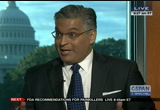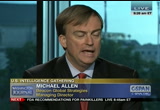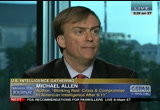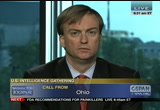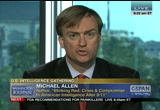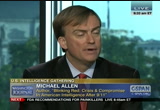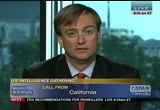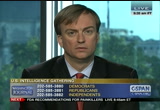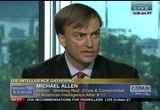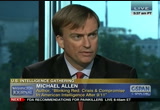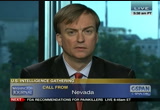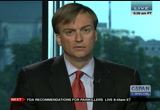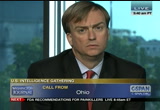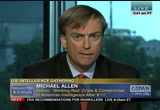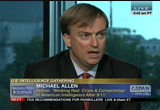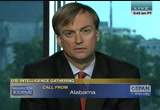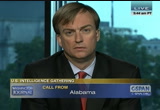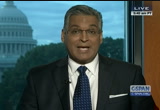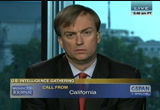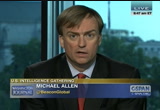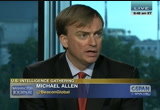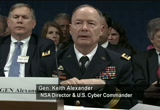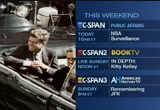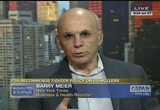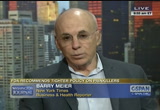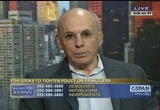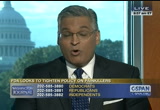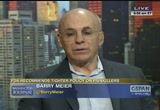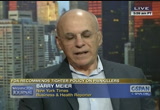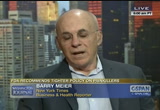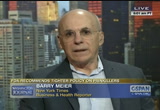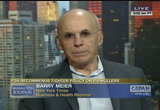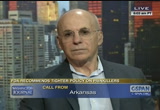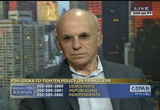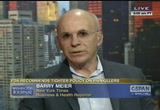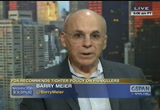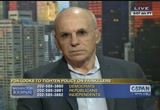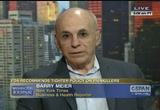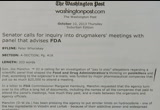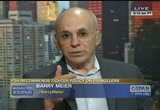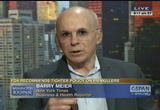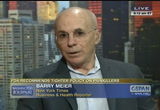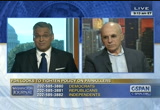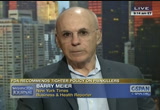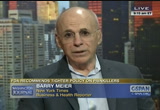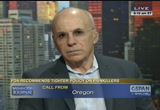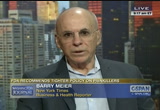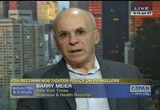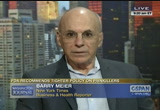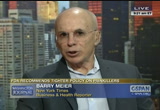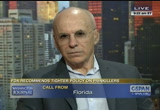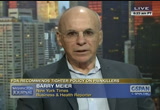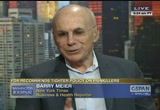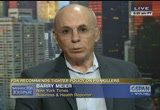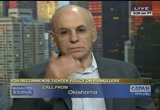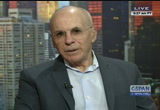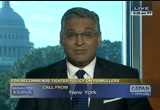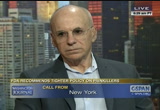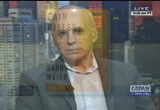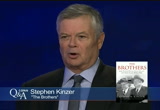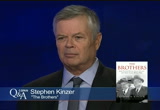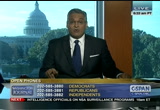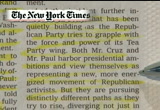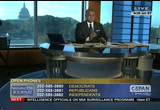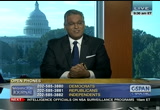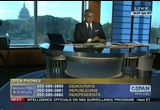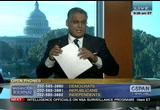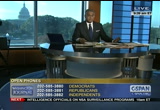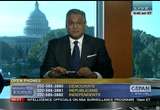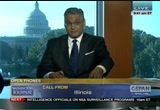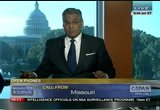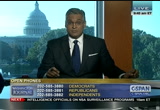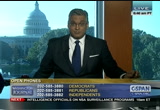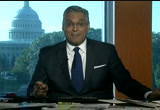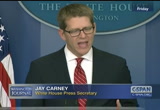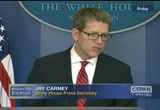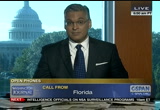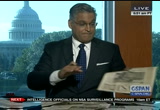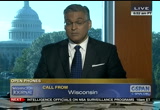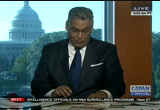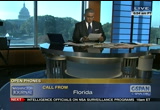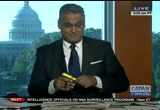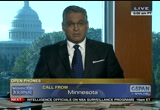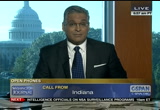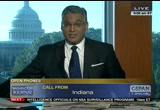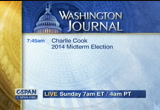tv Washington Journal CSPAN November 2, 2013 7:00am-10:01am EDT
7:00 am
♪ secretary of state john kerry says he will stop in egypt to discuss i lateral relations. wall street journal this morning reports that banks are behind increase of people going to the irs to discuss money held in swiss accounts and the banks are telling current and former employers that names could be disclosed to the public. in light of the shooting yesterday at los angeles international airport, the first 45 minutes this morning we want to get your thoughts on the
7:01 am
overall topic of airport security. not only what was demonstrated yesterday, if there is a need of increase in security from the federal government or if there are other ways to make the airports safer. here is how you can comment -- you can send us a tweet at c- cspanwj,-- @ facebook.com/cspan, or you can send us an e-mail at journal@c-span.org. here is the headline from "the los angeles times" this morning --
7:02 am
7:03 am
your thoughts on airport security and if you think changes need to be made in light of what happened yesterday at los angeles international airport. we divided the lines regionally. if you live in an eastern or central time zone -- again, tweets are available, post on our facebook page, and send us an e-mail. withresident was briefing the iraq he prime minister yesterday. about whatwas asked
7:04 am
took place in the airport yesterday. here's the president's response. it butre concerned about i will let the law enforcement folks talk about it directly. host: that is the extent of the statements yesterday. there were others made from homeland security. your thoughts on airport security -- we start off with gilbert who joins us from tulsa oklahoma. good morning. good morning. on airport security, we cannot separate airport security from the rest of the country and the rest of the world. practicing conflict resolution. that man who came in their shooting yesterday, he has a mental problem. he had a problem with someone and he was paying them back.
7:05 am
look at what we have done all over the world. if you want to solve a problem, get a gun and shoot them. look at what we have done. we cannot separate the airport from anything else in this country. startd to stop and talking to people rather than shooting people. we have not been able to do that. host: how does that play out when it comes to airport security and talking to people. half --same here and same here in oklahoma. -- 360 peopleo who have been shot and killed in this country. someone will get something through to pay someone back. you can make your point on the phone lines. a couple of facebook comments this morning --
7:06 am
those are just three comments on our facebook page this morning. you can join the conversation at facebook.com/c-span. here is mark from philadelphia, pennsylvania. i think what we need to do is -- i think it's ridiculous that these people are not armed. they are the first-line line of defense against to these maniacs . i think it is ridiculous. --t: you mean tsa agency e
7:07 am
tsa agents? caller: i'm not talking about 10 yards or 20 yards away. i'm talking about have somebody somewhere in the immediate facility with a weapon. airport was roaming the and nobody with a gun was anywhere to be found. as far as other procedures that could take place either from the airport loss -- airport's point of view or government's point of view, your thoughts on arming tsa agents, what are your thoughts on how to improve overall airport security? i guess you have to get them in the front door. this guy apparently walked in the front or with a weapon. if you go to a lot of places, schools or whatever, you walk
7:08 am
through a metal to tactic. that is what we need, get them from the front as they come in the door. host: the orange county register has a graphic. with a man opened fire semi automatic weapon. this is the tsa screening area. he continued to shoot, according to a witness. tsa officer gerardo hernandez .as shot from the point where he enters into the point where he gets to that mind, we are asking about overall airport security. do you think things are situated as far as having tsa their? make your thoughts known. dallas, texas is up next, here is ralph.
7:09 am
you are on go ahead. i was watching everything, the television, when this was unfolding. do believe the airport security needs to be trained a little bit more. i do believe some of them need to be certified to carry notarms so the stuff does happen again. they mayad been armed have prevented this from the gentleman getting to the food cart area. i will take my answer off air. host: before you leave, do you think more security needs to be done before you get to the point when you walk into the tsa line, as the previous caller put it to? more security might be
7:10 am
-- the problem is not more. itthey are not well-trained does not matter how many you have. somebody will do this again. host: do you think about the stuff when you go to fly at the airport? caller: i used to work security. they need more training so they can observe -- if they had somebody that was trained a little bit better, maybe the gentleman would not have been able to get to the first area. host: use a train and observe, put those two things together. morer: training means stuff like an armed security should have more
7:11 am
training than a regular officer had. tell hope people do just by looking -- how people do just by looking at them. it is not right. it trained officer will know how to handle it in -- how to handle it. what type of security did you do? i used to do security over 20 years ago. what i did was different than what the tsa does. back then they did not have all the stuff going on. they need some more training,
7:12 am
get their people if it up more. -- get their people a bit up more. host: on twitter -- this question results from the shooting at los angeles international airport. bernice from pennsylvania, good morning. i was in an international airport about six months ago in a wheelchair. when the girl rolled me up to the first agent, he towered over me because i was sitting down. the first thing he did was put his two fingers up to his eyes and then back to me like, i'm
7:13 am
watching you. he kind of got a bit intimidating and did not know who i was, why was there, what my circumstances were. he got a little smart with me. they are intimidating. the girl who was pushing my wheelchair said to me he does that all the time with people. i said, first of all he does not know who he is dealing with, why i am there. the last time this happened to me in a florida airport five years ago when a ticket agent gave me a rough time about the carry-on beauty he was only -- carry-on. i could very well have reported him. i should have asked him for his name and maybe give him a little heads up. of course i wasn't going to report him.
7:14 am
i let him sweat it out a little bit. you just don't do that to passengers who you have no idea who they are. i was perfectly confident and she said, he just -- he said to me, oh i talked with my grandmother. i thought, i don't care, sir. you are supposed to be following the rules. host: because of that experience and especially from what you heard yesterday, how would you describe or what i your thoughts on the current state of airport security? i know it is a very hazardous job for them nowadays. i think they should not fool around and get personal with passengers. i don't know. say.'t even know what to there are all those crazies out right up get the guns to practically the jetway.
7:15 am
comes to the federal presence, do you think it should be extended beyond tsa to make airports more secure? caller: i think they are doing the best they can but people are unpredictable. i don't understand he got through -- how he got through with a weapon. i know there's a lot of x- raying. trying --ink they are just my opinion. people are going to do with they are going to do. host: here is charles from florida. caller: good morning. they should arm everybody. that will shake everybody up. i know people. secure and you have a , they are notu
7:16 am
7:17 am
-- here is don from nevada. caller: thank you for taking my call. it is a bit much when a person with an automatic rifle can walk through the door anywhere in the airport. courthouses, in order to get through the front door you have to go through a metal -- metal detector. i think it would be a good idea if they did that before you enter the airport, right at the doors, put in medical that put in metal detectors with armed security guards. they can detect an automatic rifle at the door before it happens. to let them go into the airport is a bit much, especially with an automatic weapon.
7:18 am
or even a terrorist. that is all i have in my comment. oft: have you flown out where you lived many times or even a cable of times -- a couple of times? out of justve flown about every major airport in the country. [indiscernible] think airport designs with -- is it to open how people gain access to an airport? toyou think airports are open as far as how people get in? would: yes, i think that deter the sickos that carry automatic weapons. with an m-16 weapon and start shooting at innocent people, children, is a bit much.
7:19 am
host: betty from spring hill, florida. good morning. caller: good morning. i think we should give these crazy gun control killing problems to the national rifle association to solve. they caused this gun problem with these repeater rifles. host: what about airports, what is their role? has controlhe nra of everything, that would be it. betty fromis florida. from "the washington post" this morning --
7:21 am
here is build from spring valley, new york. caller: good morning. you need to set up an outer barrier. you are not going to get your bags and the airport terminal -- car bombs have been used in the past. airports areof the sufficiently guarded so you could not drive a car into the airport now. lax -- think security should start as early as the parking garage? caller: as soon as you get out of the cab or limo, those bags
7:22 am
need be checked before you enter the terminal. you watchedopsis yesterday, he was only interested in certain parties. if a terrorist tries the same [indiscernible] yet to set the barriers further back. do you think air travel would be ok with an extra layer of security? out -- put aarrier barrier out. we have mass of people congregating there. if they would stop somebody like yesterday from getting inside the terminal with a loaded weapon or even a bomb in the bag, it doesn't matter what it is -- host: from twitter --
7:23 am
your view of airport security is our topic after the shooting at los angeles international airport. justin is up next. iowa.from red oak, caller: i just have a quick comment. something that bothered me about come a especially dealing with tsa and the whatnot, a lot of these places -- first of all, i would like to make a point of clarification. don from nevada said five times this was an automatic weapon. it was a standard semi automatic weapon. it is a totally legal advice -- legal device.
7:24 am
number two, about tsa, this is something that should have been going on. we do see, like with germany, we see police walking around with uzis. they are highly visible. there incidents are extremely low. passengers react in germany from your experience as far as these extra levels? caller: they see it as something totally normal. it is something that is a gross deterrent to any type of shenanigans. these are not tsa, this is actual police. the tsa screening that goes on
7:25 am
right now is sufficient, if not a bit too sufficient. i really enjoy this idea that there is a prescreening now, where you can go on and do your fingerprint and so on and so far -- and so forth, enabling you to have free movement. airports like in germany and in paris, you can see these people mean business when you who are heavily , carrying a cosmetic rifle like an m-16. have annot allowed to m-16 but you are allowed to have an aar 15. an ar-15 15 --
7:26 am
as these areng local police officers rather than something nationwide, so the municipality is the one paying for this, having more federal taxes going to something like this. host: here is an e-mail this morning from sue -- alfie from arizona, good morning. caller: i have been watching since you came on the air.
7:27 am
my first comment, to the lady from florida, we do not want the nra taking care of this. they want everyone to be armed. fewer people armed is better off. as far as security, i don't have a problem with it. i do not fly that often because i don't have a place to fly to. i have always enjoyed feeling secure. accidents happen. we are -- we have people who are we have tohelp read watch out for ourselves, trust those in charge to watch out for us, and to live our lives the best we can. thank you so much. host: we will hear next from velda from los angeles. i fly out of lax when we fly.
7:28 am
alerthen lax is on high they do not take measures like florida. florida high alert is very intense. you cannot even get into the airport. car, theyder your have the bomb sniffing dogs. a question you before you can even enter into the airport. alert, theyon high don't go under your car with the they don't take things very seriously. i guess we haven't had anything really happened here. i am not going to fly. everybody has to got start looking out for each other. host: where do you fly to
7:29 am
florida where you get all the security precautions? caller: tampa. we fly out to fiji, puerto rico, is verytampa security intense. because ofu think the volume that takes place at los angeles, what is done in tampa could work in los angeles? caller: everybody is in a hurry. but we have to slow down. we have got to slow down. i don't care. take -- i would rather arrive at the airport to our three hours before my flight , three or four hours if necessary. we need security before we even
7:30 am
get into the airport. it should be like the courthouse. we should have x-ray machines and security -- we should not be allowed to enter into the airport. far as future trips out of lax, are you going to take any? caller: yes, i live close to the airport. it is very convenient. in aboutosed be flying four more months. you can weigh in no matter where you live in the united states on the phone lines, on twitter, on e-mail and facebook. we will hear from another californian. this is john from fairfield. caller: i travel every week somewhere. i wasn't there yesterday but often times i am on -- i am at lax on friday.
7:31 am
i am a simple traveler. without breaking a sweat i could tell you how to get in an airport, it is not difficult. the entrance is fairly secure. somebody says florida is more secure. some are better than others. if you want to get into an airport, going to the exit. recently i came home through sacramento and it was about 10 p.m. there was one agent through the exit sound asleep at a podium. i woke him up and he was startled and i continued on. i didn't think too much about it and then a month later, about 10 p.m., same airport and same exit, sound asleep. i took his picture with my cell phone and woke him up. he was startled and i
7:32 am
complained. i said i want to speak to your manager. he said the manager is back in the airport. i had already left and he said i can go in and and talk to her. walked about 100 yards and spoke to her and gave her my business card, i work for a large company. military andin the i suggest did why don't you have the tsa agents stand? they are less likely to follow steep -- fall asleep standing. i cant breaking a sweat, tell you how easy it is. i'll give you one more example that comes to mind, when i am at my home office i have big scissors, i called him shares -- call them shears. a month ago i misplaced them and i got another pair in the
7:33 am
drawer. for a month i traveled every week somewhere in and out of airports. just the other day i found them in my briefcase, the same briefcase that gets one through security five times a week. host: do you do international travel? caller: i do not. host: do you think the federal role in airport security should be expanded the on tsa? caller: i don't know, common sense. wasntinue to travel and he -- and use lax. at some point you have to take your chances and live your life. now that i am thinking about company i work for sells equipment.
7:34 am
if you are just a terrorist -- somebody could have walked in with a machine gun and camped out at tenet night until the morning in one of the restrooms until everyone was there and came out and just taken everybody out. that is john from california. if you go to national journal.com. nationaljournal.com, a -- there is a complete list if you go to the website.
7:35 am
not only the type of weapon that was seized but also the airport. nationaljournal.com is where you can find that story. we are talking about airport security. do you think it should be expanded the echo is there a federal role for expansion? give us your thoughts for the next 10 minutes. john from washington dc is next. i don't think we should have more security. i think we should have less, to be honest. this was bound to happen in a nation of 250 million people. nothing was going to stop this guy from doing what he was doing except for possibly the people around him understanding what was going on and catching him before he got to the airport in the first place. somebody said tsa being the first line of defense, but that is not sure they are the last line.
7:36 am
the first line is the community, people around us. community mental health is the real issue here. host: here is roy from maryland. caller: good morning. tsa needs to be armed and all of the airports need to be tightened down. that can drug dogs detect weapons of mass destruction. all the exits need to be close down and locked up like fort knox. host: that is going to make it difficult for the traveler. if they come in, the crazy people, they need to be locked up. cry -- outis out of
7:37 am
7:38 am
i think they should have the presence of armed police officers at a local level. let people see that armed police officers are walking around the airport. tsa officers found these firearms and stuff and they should mention in reports how many of those were law abiding citizens with kerry permits -- with in sealed weapon carry permits. been one of those people at the airport they could have saved somebody's life and host: is there a reason you say more of a local police premises -- police presence rather than a tsa presence? morer: the government gets
7:39 am
and more involved in our lives. we need to rely on our local law-enforcement. it would be a comfortable level if we had local law-enforcement carrying their weapons so people could see and know at a local level that the people there involved with the community are there.n -- are schools get attacked because they know there are no armed police there. if you put some armed police officers there, just at a local level, no more federal government, i believe it will make a big difference. host: here is marty from baltimore. caller: i just have a couple of comments. the gentleman who just spoke was on point with a lot of things. as a former police officer, you
7:40 am
do not need federal officers in their. the local officers can do it. maryland,rport in there is authority transportation police did they are armed, well-trained, it does not need to be federal. if you placed one or two at each screening area, if they were to that isassault weapon deterrent enough. this guy may not have gotten as far as he did, he could have started shooting prior to the tsa. you don't know what their intentions are once they enter. he could have started shooting once he entered the airport. local police would do just fine. i think it is on -- it is wrong to armed this tsa officers. i have seen a lot of them at work. it kind of for minds me of rent a cop. you don't want to give anyone a
7:41 am
weapon. it -- just anyone it weapon. you also have officers retired like myself, i carried two gun permits. one where i can carry a weapon throughout the country and a local state police hand permits that i can only carry my weapon with that permit in the state of maryland. if they list the law where officers that are flying or retired officers are flying, to be able to carry their handguns, the airport is notified ahead of time, they already know that you are armed at that facility, at that airport. that is also a way that could deter something, by allowing us to fly with our weapons. host: have you carried weapons on board before? caller: i have not. if i do, have to check my handgun. i have to have it unlocked,
7:42 am
unloaded, and checked separately. host: a national journal story i just read stated they found 29 weapons in the tsa. what do you think of that? caller: can you repeat that? host: the national journal website had a story about tsa officers seizing 29 or 30 guns, some of them even loaded. i want to get your thoughts on that kind of thing happening, especially with your experience as a police officer. caller: there is a problem with that happening. it is obvious there was a lack that a lapse somewhere in security that should never have occurred. i don't understand how those weapons were even gotten to the screen area. host: the authority police, those are local police officers but they are paid by the transportation authority? caller: transportation authority police -- it falls under merlin,
7:43 am
i believe. they are assigned to the airports, assigned to the harbor , to thee harbor tunnels key highway. they are already so -- already assigned the third group -- already assigned to the thurgood marshall airport. thethem walking around in airport. i think we have a safe airport here. i think local police can handle that. each airport, maybe they can get their own private police department for each individual airport. dogs, bomb squads, their own units. host: what type of police work did you do? a patrol officer, than a motorcycle officer, then i ended up in community outreach
7:44 am
where i dealt with the community and a lot of juvenile issues. i have worked with a lot of different communities on identity theft and scams. host: that is marty from baltimore maryland. this is fort lauderdale, florida, hello. caller: and my on the air? host: go ahead. i am retired from mental health. i was an intensive case manager. withked with clients mental illness and substance abuse issues. role isthe underlying unresolved mental health issues and gun control. the family said he was suicidal that morning. think of everything that has happened, the school shootings, everywhere.
7:45 am
it is all unresolved mental health issues. it doesn't matter how tight we make the security. and then there is the gun control issues. .ost: that was marilyn we will take a call from matt in north carolina. good morning. did tack at lax is within the scope of what the tsa does and airport security. , airport security is about preventing terrorist attacks, something like hijacking an airplane. i haven't heard his motives yet. a disgruntled employee or -- ine with mental issues,
7:46 am
have opinions on both airport security. a caller earlier said you can have too much. i agree. -- that isterrorists what is happening as a country. we are stunning all this money on security. i think a lot of it is unnecessary. i don't think terrorists are one of the of the hijacked -- host: let's leave you there because you are breaking up a little bit. all the comments this money. for our next segment we are going to talk about key intelligence figures on capitol hill this week, questioning it information collecting practices. allen, intelligence expert, joins us next to talk
7:47 am
about what goes on as far as intelligence gathering is concerned. and the food and drug administration -- barry meyer will stop by. ier will stop by. a lot of talk about the farm bill this week. vilsack sack -- tom talks about the food stamp program, the farm bill overall, the conference committee that took place this week. here he is talking about these topics. a we will -- >> we will be investing billions of dollars in an energy bill. if money is going to be invested canenewable energy, it change the economy. it is a research bill because this bill will provide resources
7:48 am
to universities to come up with new innovations. because of our research initiatives, i think 364 patent applications have occurred just from usda sponsored grants. it is a conservation bill and the ability to protect their soil and water. it is a trade bill because this creates the sources by which we can promote agricultural trade. part of what is lost in the discussion in this town is the scope of this bill. we focus so merrily on the commodity title and the snap in to the nutrition title that we fail to recognize everything in between. that is why i am encouraging congress to get this done. yes there are consequences. the benefits are huge. frankly, if we want to talk about infrastructure and jobs and renewable energy, if we want to talk about trade, it is in this bill.
7:49 am
if people recognize that i think the bill will encourage their members of congress to get this done and get it done quickly. nemechek to ask you why this is so important and has such a widespread effect and it ministration seems to be standing on the sideline. >> i don't think that is a fair characterization. day,e working every single our staff and teams are working. i am meeting with and talking to chairman lucas, ranking members, members of the conference committee. that process is ongoing. i am not quite sure what folks would expect us to do be out -- to do beyond that? that is the most important thing to do, provide tools and equipment and data that will allow these conference committee members to get the right policy. >> "washington journal" continues. our guest is michael
7:50 am
allen, a managing director here in washington dc. he is the author of "blinking red: crisis and compromise." welcome. can you give your experience when it comes to intelligence matters. bush whites in the house for eight years and worked in the national security council. i was the legislative for presented of for the house intelligence committee and the senate intelligence committee. part of my work was to help reef the committees with the incentive tell -- with the incentive intelligence programs were. i went on to write a book about intelligence. i was last three years
7:51 am
staff director of the house intelligence committee, which is charged with certain oversight responsibilities, including budget and having a lot of hearings to delve into a lot of these intelligence programs that are in the news today. >> speaking locals -- speaking global strategies, what is that? that is a consultant agency. our job is to navigate clients and to translate to them that the cult -- the difficult -- host: when people ask about , how do you matters explain what goes on with intelligence gathering? explain that the very reason we created the intelligence community was foreign intelligence collection. our policymakers have guided a variety of things on -- have a variety of things on their plate.
7:52 am
they have counterterrorism issues all over the world and they need to be able to make better decisions on behalf of the united states. they need to be able to advise the president. when they look at a hard question they turn to the intelligence community for help. they say, here is what i need to know. here are your requirements. please find for me what a particular foreign leader's intentions are in negotiations with iran or please give me warning of an imminent terrorist attack. that is what the american people have demanded of their leaders, especially post-9/11. they want better performance from the intelligence community so we can keep them safe. host: even to the point of listening in on allies? guest: you have to think about
7:53 am
what the intelligence community's job is. if a policymakers says the national interest is to prevent iran from getting in nuclear weapon, they are going to want to know what is the strategy to do that. in this case it is to try to sanction iran so they come to the negotiating table and give up, or at least curtail their nuclear enrichment capabilities. you can see where a policymaker would say, we have sanctioned iran as much as we can as a country. we need our allies to similarly sanction iran. would come in, where is germany on a particular sanctions idea? where is france or a variety of other countries? would come why this up in a requirements process and a discussion on how to achieve -- on how to achieve a foreign- policy objective. in on personal
7:54 am
cell phone calls, does that go too far? guest: our leaders need to apply a balancing test. they have to weigh the foreign intelligence game from such a sensitive axes, like you are saying, in particular intercept of a foreign leader's phone call. a foreign-policy flap would result if it was disclosed. you have to apply that balancing. i think judging from the newspapers that is what the white house is doing this week. they are reviewing the posture of the intelligence community on these collection priorities. are going to apply this test to see what makes sense for the country. appropriate?back guest: it is safe to say the snow back -- the snowden relation did -- revelation
7:55 am
caused blowback. host: he was a game changer in all this, would you agree? caller: i think so because this is one of the greatest leaks and compromises in american intelligence in our history. it is the equivalent of giving the other team our playbook. going to be looking back on the snowden years for years to come, perhaps as a point when some of our collection capabilities don't. we will have to ultimately see what the price we will pay for that is greater -- is. snowdenter the revelations came out, people now know about them, and yet this week even some legislators have said that it comes to the point where we talk about angela merkel, it may have changed the
7:56 am
perception to even some on .apitol hill perhaps we need to bring more oversight into what is going on at nsa? i support aggressive oversight of the intelligence community. this is the deal we struck as a country. we have democracy. it is not necessarily completely in harmony with an aggressive intelligence community. we have had to set up institutions and structures where we try to balance these competing national interest. in thethe ways we did it 70's was to create intelligence communities and ensure that all --bers of each community was ultimately it is the president's call. they help make a judgment about what politically we are able to achieve in terms of intelligence collection. . host: if you have questions for
7:57 am
our guest, you can call in on the phone lines -- if you want to send us an e- .ail, journal@c-span.org we will take those momentarily. michael allen speaking global strategy hearing d.c.. he is also an author of "linking red." has intelligence gathering and sharing got better after 9/11? guest: absolutely. we have rebuilt the intelligence infrastructure so we can share information better. this is what my book is about. it is about iraq wmds and 911.
7:58 am
the 9/11 commission -- a spymaster to oversee the agencies in the intelligence community, including the national security agency. the book is about how we created the superstructure and whether it is doing what the congress wanted it to do, to make intelligence collection more efficient and intelligence a better enterprise. how is james clapper doing? sayingthere are articles he quieted the ship. written saying he exercises a lot of oversight. i think people are taking a hard look. host: how is he doing in this instance? how do you think he is handling this specific problem over the
7:59 am
last weeks with angela merkel and others? it is the job of the director of national intelligence to speak on behalf of the entire intelligence enterprise. i think he was very helpful in trying to put in context what the intelligence community's mission is. it is not that the nsa just decides on its own that it wants to go cap a particular foreign leader's phone call. in explaining we have requirements, policymakers at the national security council, and they go out and respond to particular tasks. public that was a useful reassurance function that the dni was exercising this week. host: let's hear from james clapper. [video clip] demo we have alarms go off 11 terrorist communicates -- if we
8:00 am
had an alarm when one terrorist committees with another terrorist our job would be easier. over the past month i have declassified and publicly released a series of documents release a series of documents related to both section 215 of the patriot act and section 702 of the foreign intelligence of real impact or fisa. anng that facilitates informed public debate that operate under these authorities. we felt that it might of the unauthorized disclosures, the public interest in these documents far outweigh the additional damage to national security. these documents let our citizens and see the seriousness, the withess, and the rigor which the fisa court exercises its responsibilities. the also reflect intelligence community, particularly in s.a.t.'s commitment to recovering, reporting, and collecting -- the nsa's commitment to recover, reporting, and correcting. particular targets of
8:01 am
surveillance, but we will continue to declassify more documents. that is what the american people want, it is what the president has asked us to do, and i personally believe it is the only way we can reassure our citizens that the intelligence committee -- community is using tools really. host: takeaways from a? -- from that? guest: he is trying to reassure the people that they have congressional oversight. not only due to congressional committees oversee their programs, but he is trying to address head on this accusation that the five the court is a rubber stamp. he is trying to explain that it is anything but a rubber stamp, that they are very aggressive in trying to hold the nsa and the department of justice to account, and i think he is trying to reference some of the decisions that have been released in the past few months. he is talking about somebody has released in the name of transparency, which go a long way to show that the five the
8:02 am
code -- the fisa court is being rarity -- very rigorous. host: democrats line with michael alan, brian, good morning. caller: good morning, sir. mr. allen, first off, we are a republic, not a democracy. second, the bill of rights is being violated, privacy is being violated, our national interests -- everybody is proceeding as now as an aggressor. this is not new. of we have even gotten rid habeas corpus in certain cases. the last time this happened, my aunt was hung and washington, d.c. with bad intel. i worked on the intel side and teaching it. this is treason, and whoever wrote this stuff, you can put all the fancy stuff you want on it, but you are violating the bill of rights and the constitution of my country.
8:03 am
as a retired marine, it pisses me off. guest: fair enough. a lot of people feel very strongly about some of the intelligence programs that we have put in place since 9/11. got to, however, we have remember why the policymaking community and the intelligence community have gone to more aggressive collection techniques since 9/11, and that is because we were horrified by what happened, and and we had an extensive auditing of what happened in these particular intelligence failures, and one of the conclusions that these commissions made about iraq and about 9/11 was that we had insufficient intelligence collection. indicates of 9/11, we had 9/11 hijackers living among us here in the united states, and if we have had some of the tools that we have now, particularly the 215, which is so much debated -- host: of the patriot act. guest: of the patriot act.
8:04 am
the records of who called whom. if we had a particular program in place, we might have been able to figure out when one of the hijackers was in san diego, who he was calling around the united states, and we might've had a fighting chance to try to foil the plot. policymakers in the intelligence community are coming from when they try and say here is why we did these intelligence programs, but i understand the caller's frustration about it. it is something we're trying to find the right balance between security and our democracy. the republicanon line, blake, st. petersburg, florida. hi. caller: good morning. my comments for michael, i understand the premise rebook, "blinking red," -- for your book, "blinking red," counterterrorism. in 2007, secretary of state john knowledge ofn the
8:05 am
building seven to strengthen veronica may was brought down in a couple -- in a controlled fashion. why does the 9/11 commission never want to mention building seven in their reports? guest: i think it 9/11 committee did a good job trying to run on every particular theory out there on how the 9/11 attacks occurred. so i would have to go back and check specifically and talk to some of them about whether the examined the issues you mention. generally, i think the commission's rendition of the facts of 9/11 were generally thought to have been very accurate. there were controversies about the recommendations, and that is what the book is about, but on the actual facts of the 9/11 story, i think most historians think they got it right. host: joining us now to talk a little bit not only as far as what is going on but reaction from capitol hill is jeremy herb with "the hill." thank you for joining us. guest: thank you. host: talk a little bit about
8:06 am
legislative efforts when it comes to intelligence gathering. a couple of things on the horizon being worked on when it comes to oversight. what is being discussed on capitol hill? guest: two competing bills came out this week. one from senator patrick leahy, chairman of the judiciary committee, and jim sensenbrenner, one of the co- authors of the original patriot act, and one from chairman diana feinstein, the intelligence committee head. whatehi-sensenbrenner bill in the bulk -- the leahy- sensenbrenner bill would end the bulk collection. find signs codifies that w hile placing some researches on it. host: why target the specific activity? leahy and sensenbrenner and critics say the program goes too far and it does violate americans privacy.
8:07 am
they say it is not actually in counterterrorism and it is just collecting the phone data of millions and millions of americans. feinstein disagrees. she says that this is a key counterterrorism program and it is legal as well. that is the other disagreement over the legality of it. one is in the judiciary committee, leahy's bill, the other in the intelligence committee. ecb divide their. the -- youd divide see the divide there. bill,t of leahy's conservative and libertarian- leaning conservatives like rand paul, find sign -- feinstein's bill is supported by chambliss, vice chair of the committee, more moderate democrats. we had a vote in june, i believe
8:08 am
it was, over an amendment from congressman just in a mosh that would've also ended the phone data. it was every". we've only seen more and more outrage and congress over these programs. host: let's talk about hearings. what is the action? the senate intelligence committee markowitz bill this week. it was an 11-4 vote. one try to do more to into the data program, that was rejected. and i go to the floor, so leahy said his bill will get marked up soon. what happens from there will be interesting to see how harry reid wants to do with these two competing bills on the floor. and two major forces behind it is for the legislators themselves. guest: absolutely. senior democrats have been here a long time and they agree on a lot of issues.
8:09 am
it is just on this particular one, feinstein is very adamant, even though it is interesting because she criticized the nsa this week over for spying on foreign leaders, but that is something that these two bills do not get into. they're mostly about the phone collection data. is an advocate, feinstein's bill may let eighth friend of the-- a court submitted. it is about the phone data as opposed to spy on foreign leaders. host: all right, jeremy herb talking about," legislation that was marked up this week. mr. herb, thank you for joining us on a saturday. your reaction to this specific legislative efforts. guest: i think jeremy is exactly right here we have a jurisdictional rivalry in the senate right now. we have two committees that have jurisdiction over the foreign intelligence surveillance act, and they have different views on the particular intelligence programs that have been done in
8:10 am
the name of fisa. so senator reid and senator mcardle are going to have to try to work through which bill would actually make it to the senate floor. of course, if you have to have 60 votes come it really feels like there might be a lot of procedural hurdles to get through to see action on the in the senate. host: butler, oklahoma, is where randy is. he joins us on our independent line. taking myank you for call. i've not watched the intelligence community pretty serious the since 9/11, and i have zero confidence that they stop a domestic terrorist locally. i think a $70 billion we spent on the national security intelligence should be spent on the local police forces. they could not stop the boston -- those two kids in boston. they are making all kinds of phone calls. level, youhe high cannot find a needle in a haystack. from a local -- if you go from a
8:11 am
local level, police officers know how to get information. detective work, talk to people. men --cess to were young who are usually the terrorists -- would be sounding out or acting out. how come they cannot stop a terrorist plot in boston? several, but they could have killed a lot more. how come that did not do it? guest: well, i think that you were saying what a lot of foreign-policy experts have noted here in washington, which is that it is very difficult to be able to detect a homegrown terrorist, someone who becomes a self radicalized, perhaps on the internet or in the case of the tsarnaev brothers, maybe by a trip to russia. this is something that we have been trying to grapple with as a country, which is we have people within our borders who may become sympathetic to find out --da-like ideology, and sympathetic to an oual
8:12 am
qaeda-like ideology. and be able to intervene before it takes a violent path like the tsarnaev brothers case. host: even a case, there were questions about intelligence that was shared and available. guest: that is right. him and that all bureaucracies and all governments have got to be able to work on better. that is sharing of information between the large intelligence community and state and local law-enforcement to make sure , to it is more seamless take advantage of technology while at the same time protecting privacy and civil liberties. this is what the congress and the intelligence community is trying to figure out. host: if i'm in the nsa and i heard what jeremy herb told me about the efforts in congress, legislatively, what is my reaction? that the nsak reaction is probably let's not over correct because of some of the issues that edward snowden has been able to put out.
8:13 am
their mission lately has been to try to make the american people more aware of the terrorist plots that have been foiled because of their action. over theseen red chili summer and even this week general alexander and director clapper be more forthright over the plot that have been foiled third if you count europe, it gets into the couple dozen area. that is something we have to be able to put out there to give reassurance to people like your that the intelligence community are doing all they can to protect us from international terrorism. host: our guest, michael allen, managing director of beacon global strategies, author of "blinking red -- crisis and compromise in american intelligence after 9/11." former majority staff, other position similar to that as well. south carolina, democrat line. caller: hi, pedro. i had a comment and a question for mr. allen.
8:14 am
you are uniquely qualified to answer my question. that ient is added up is am a retired master sergeant, and the phrase plausible deniability -- that is a relaxing, working program in the military. i cannot tell you -- there is been a few times when my commander wants to get something done, and we would get them done. he did not necessarily need to know as long as no one got harmed exactly the specific methods that we used to get it done. we just accomplish the mission. and i would set that up with comparing that to, say, ollie north and iran-contra. my question to you, considering what i just spoke about, the president has been getting a lot of criticism by supposedly not knowing entirely what the
8:15 am
intelligence agencies were doing to supply him the information that he needed. believe thatally that is a valid criticism? i will take your answer off the air. guest: well, thank you for the question. i actually do not know whether president obama knew exactly about the intelligence collection posture that has been put out there in the newspapers this week. here is what i do know as a former national security council staffer, and that is very a mike lee that the top white house -- the top whitethat house security staff would not have known about a particular aspect of the bride he has been described in the "wall street journal" this week. the reason for that is you want to be able to determine what these sources of the information that you are being presented because you want to make an assessment about its reliability. you want to be able to know if you are partnering -- if you are preparing to present for a phone call with a foreign leader or a
8:16 am
summit meeting with a foreign leader -- the president is going to ask you questions, and you are going to want to be able to answer them forthrightly and with complete confidence that what you are giving the president is absolutely reliable. it is plausible to me that in the course of some of these meetings with the president that --ame up about how we came how we got particular information. obvious the, i am not there, but having worked on the staff, i think it is very likely that at least the very senior people at the white house knew what was going on. host: with that have been translated through the daily briefing that he gets? guest: i do not think it would've been in writing. for example, here are the killer -- particular aspects. if you have exchange each morning with the intelligence community, each morning when they come into the oval office to give you the briefing on what happened overnight, i think it is part -- if part of it were something about, for example, what is a particular foreign leader's position on the iran
8:17 am
nuclear negotiations or troops in afghanistan or what is going on with the foreign european currency crisis -- i think it is possible that the source of that information came up. honestly, i do not know for sure. i was not there. host: the president's knowledge was the topic. mike rogers was asking keep alexander as well as national director of intelligence james clapper about whether the white house was aware of activity. here is the exchange. [video clip] ,> those screenshots that show or at least lead people to believe we, nsa, or the united states, collected that information, is false. and it is false that it was collected on european citizens. it was neither. >> well, it certainly has created an international rows, but what i would argue is very poor, and accurate reporting. something that we are going to have to deal with here in the
8:18 am
future. i'm glad you clarified that. mr. clapper, i am going to ask you this, giving the recent row about leaders that may or may not have been collected or numbers that may have been in the possession of the u.s. what if,ence services, in fact, any value of that information found its way to the national security council in the white house? >> it certainly could. i would rather not speak specifically, but speaking in totality, clearly leadership an importante dimension of the landscape for policymakers whether the white house or wherever. intelligence committee, which the house committee was available on information available on any foreign leadership and attention
8:19 am
plan, one it logically the administration have access to that same information? >> as i indicated earlier in my discretion, it may not have information specifically related to a specific selector or any specific collection target. what they would see, though, would be the output of this in its total dimension. >> we are dancing around the bush, but i can imagine if there were some civic output on any of that, and we are all talking almost hypothetical, it would be certainly by a trained , wouldgence professional clearly understand that maybe the intelligence services were following the national intelligence priorities framework. if that greg? -- is that correct? >> yes. host: what does it tell you? guest: people are on the intelligence community and
8:20 am
familiar with their mission are a bit taken aback by the controversy in the papers this week because the foreign intelligence commission is what they were created for. of nsa, we demand of them to collect information that is going to give the united states a decision advantage. we have that critical issues that we have got to address as a country. we are interconnected all over the globe. policymakers look to the i.c., and they say what do you know that can help me make a better decision on behalf of the president? what you heard director clapper say was often what policymakers want to know is what does a foreign leader actually intend to do? i do not necessarily need to know every assessment that every newspaper article or every person around a prime minister things. what do you think a particular foreign leader is going to do? you see clapper reflecting the view of the intelligence community that of course we were trying to get foreign leader intentions because that is what we are asked to.
8:21 am
host: here is david from illinois on our republican line. you are on with michael allen. good morning. caller: yes, good morning. officialsenior nsa commented that -- and he is now deceased -- but when the former head of the cia becomes president of the united states, democracy is dead. referencinge, george herbert walker bush. i happen to believe that whether you are talking republican or democrat, this is really a red herring, or even independent for that part. because really what we're are talking about, whether it is intelligence gathering community and the public sector, or ci, andced to caci, fa other private contractors.
8:22 am
we have a network of intelligence, military industrial complex that has really grown. it has taken a life of its own. really, it is much more about not politics but really the economics of individuals who have vast fortunes and who are about protecting that inasmuch as i'm a you know, our national interests. i really believe the dianne feinstein's attempts are really a red herring to codify many of the illegal, i believe, practices of our intelligence community. i personally believe it is trying to rein them in because they have snake tax in the we weave- tags and they cobwebs. guest: that is what i think a lot of people in the united states believe, and that is what
8:23 am
commerce is trying to address her now. they have seen as a result of the leak probably some lack of confidence or some worry about what the intelligence community is up to. so the congress has got to address this forthrightly to try to restore the american people confidence in what their intelligence services are up to because ultimately if the people don't support what is being done in their name, we are going to have major problems in our democracy. so the congress has got to be able to try and reconcile the imperative to keep the country safe from not only terrorists and the prospect of nuclear weapons spreading across the globe over time, but also be able to reconcile the very serious privacy and civil liberty issues that have arisen over the summer, and we have to find the right way to reconcile these two objectives. host: tim up next from ohio, independent line 30 good morning, -- independent line.
8:24 am
the morning, tim. caller: i am a citizen, but i'm not stupid. richard clark had his reputation destroyed, and condoleezza rice -- there was an fbi discovered the terrorist trying to steer plans in the land, stand down, and all he -- host: caller you are breaking up a little bit here to let me put you on hold and see if we can get a better connection with you. you are cutting in and out. i want to make sure you get a chance to talk fully to our guest here and we will put you on hold. diana from california, democrat line. hi. caller: hi, there, first time caller. your guess just finished saying that we have to get the trust of the american people. i am a lifelong government -- democrat. feinstein'sne
8:25 am
office, al raged it -- outraged that she is supporting this violation of our constitutional rights that i have never been more active in following the hearings that the senate, at the congress level. i will never, ever again vote for a democrat that supports the status quo. now, you are supposed to be concerned about restoring trust of the average citizen -- it is never going to happen when we go see clapper fired at the minimum to ourhting to -- lyringying representatives speared we are not stupid. we have a modicum of intelligence. we who normally are loyal democrats are not going to put up with it. we just aren't. thank you. host: did you get a response from a senator's office of any type? caller: no, just a very long e- mail explaining that we have to agree to disagree. no, she is part of the money
8:26 am
, supporting --ng she gets all kinds of support from these contractors. it is part of this money mating -- moneymaking mechanism. we are not full. host: -- not fooled. host: that was diana from california. guest: a lot of the members of the intelligence community go to classified briefings, sometimes for, maybe five times a week. they get some of the most significant intelligence about the threats to the united states. i help -- i think that health color their attitude about what the intelligence community ought to be up to. i think the thrust of what you are saying is that the intelligence community and the president got to do a better job explaining that the intelligence community has no interest in
8:27 am
listening to the phone calls of the average american. what they are interested in and those that might be agents of a foreign power who are engaged in some kind of town -- kind of counterterrorism activity or in some cases helping with the proliferation of particular nuclear parts and the rest. we don't have the resources, the to beor the data capacity able to do the type of collection that some people think we are doing on the american people when we are just not cured they are forbidden by law from doing it. we have courts, inspectors general, and congress aggressively checking the work to make sure that does not happen. does the intelligence community press shock with what happened with the chancellor, or people get rid from things, knew about the things that are going on but still expressed shock? guest: that is very possible. use our chairman rogers said this week where he said there
8:28 am
are mounds of intelligence reports in the offices of the house intelligence committee the -- community up on the hill. it is really incumbent upon those of us who work there and those of us who had the opportunity to see their work, to try to be aggressive and be studious about what the intelligence community is doing so we can ask the right questions of them before he comes out in the newspaper. host: what is a briefing like? guest: in a secure, facility,ted and it is soundproofed to thwart use dropping, ironically enough. eavesdropping. it is basically a smaller hearing room. it is much more collegial than the ones you see on television. you get a frank discussion and a frank exchange between the intelligence community leaders and the committee spared in many cases, the intelligence community want to come up and
8:29 am
explain what they're doing because they want the support of the peoples representatives, but what their mission is, because they are right up there on the edge -- host: can a member leave the hearing and do follow-up investigations, research on their own on the topic they have been briefed about? guest: they can. they can work with the republican or the democratic staff of the house or senate intelligence committee and say i would like to follow-up on this particular issue, and they often go out to the intelligence agencies and asked were briefings and receive them. the it is usually discretion of the chairman and the ranking member about what the committee will do sort of as the committee to dedicate all the resources of the staff because like any congressional committee, you have got some limitations on resources, but yes. individual members of the committee can follow up on the issues. host: cannot that extent if the research or intelligence and western is being done by a contractor -- in question is
8:30 am
being done by a contractor? guest: absolutely. we are trying to find the right balance. 9/11, youases after needed contractors because all of a sudden we needed thousands of speakers in arabic or one of the dialects and afghanistan. -- in afghanistan. we do not have that function already inherent in the intelligence community. we had to reach out and find it quickly. the only way to do with the contractors. i think republicans and democrats are tried to find the right balance between governmental employees and contractors, but we do need contractors to do some of the special technology that helps the united states keep it that. host: let's try tempora ohio again on our independent line. go ahead with your question or comment, tim. caller: richard clarke warned ahead of time of 9/11, and afterwards his reputation was pretty much destroyed.
8:31 am
condoleezza rice just pooh- poohed everything. cheney got his war in iraq. they had nothing but no-bid contracts, ok, and obama is doing the same thing. they did it with this affordable health care. and there are too many intelligence agents. when you compare world war ii and now, and i know it is a totally different situation, and you need more, but you have so many people. if you look at what the russians did with the atomic bomb, you know, we discovered it, and they got it, they got everything on the cheap because of our poor intelligence -- i don't know what to call it, you know, to prevent spying. -- there no so many indication between the departments, and you saw the guy who shot up the naval yard, the contractor that allowed him to have his job, you know, like,
8:32 am
did a really great job, and then there is no penalty for people who break the law like, say, where they call when they grab the people overseas -- host: tim, you put a lot out there. we will let our guest respond. is ontohe caller something. after 9/11, people were frustrated about the inability of the intelligence committee -- community to connect the dots, to be able to find a memo that someone in the fbi had written about perhaps people that were extremists taking flight lessons and connect that back to activity around the world that suggested that terrorists were trying to get into the u.s. that was what people were frustrated about. that is what richard clarke and others testified to the 9/11 commission, and that is why we tried to redo intelligence in 2004, to create a national
8:33 am
counterterrorism center to try and fuse information connected -- collected domestically with intelligence collected overseas. this is an ongoing project of the intelligence community to be able to try and fuse together all the information that we have in these vast enterprises so that we can try and keep people safe so that we do not have another september 11 disaster. many you talked about too people being involved in the process. the dni oversees 16 intelligence agencies. are there too many people? guest: there are a lot of people in the intelligence community. i think what is going on as we go through budget pressure is the congress and the executive branch working with the dni are trying to right size the intelligence community. the budget has actually shrunk a little bit in the last couple of years. ironically, when we are so facing the threat of terrorism, and we have a middle east that is blowing up, we have new challenges that we have got to be able to face at the country from syria to egypt to the rise
8:34 am
of china. a lot of us argue that we should not cut the intelligence community too much because the challenges if the -- the challenge is that the u.s. are facing is getting more and more obligated. -- reginald from california, republican line, you were on, hello. caller: i'm a grad student here at stamford, and my father always called my family eisenhower republicans. my family has been republican since the -- i have got to tell you, mr. allen, i do not envy trying to sit there and listen to his schizophrenic rendition of moronic tropes. the president call from golf warning i had to say gosh, ma'am, who in hell are you that the government wants to specifically listen to your
8:35 am
conversation and track your e- mails word for word? there is a string of lunacy running around here. for republicans who seek to pile on the curl -- the current president with their rendition, knowingly some type of obnoxious , self-imposed awe that the authorities are trying to keep us safe -- you should be ashamed if theself because previous president had been an officer now, you would be spinning up these programs left and right. iso not know what the hell happening in this country as far as the water people have been drinking and the fact that the media, the media always seeks to fewow narratives and pushes stories for sales instead of doing their due diligence. guest: i agree with the caller
8:36 am
that the media and those of us that are out speaking on these particular issues have got to be very judicious about the facts, try not to secession lies what is going on. i think you saw this week at the suggestion that the united states was collecting millions of conversations in europe only to see the dni come out and correct the record later in the week when the general counsel said that these were, in fact, elected by the french intelligence service and they were given to the u.s. as part of the counterterrorism program. so when we read the articles, we need to be able to take a deep breath, try and keep it in context, and let's wait until the truth comes out through hearings and the rest. a lot of what is in the media is obviously very true, but we have got to be very careful as we try and parse through what is happening and why. from you hear statements
8:37 am
the security saying we only collect the metadata, we do not know who does what and where and less we specifically ask to know is skeptical about those kinds of things. how do you equate their concerns? guest: that is what the members of converse about to be able to do. commend the people that we have oversight so they can be validator's of what their mission is. we have got to be a will to have members of congress stand up and say yes, i was briefed on a particular program and i am confident that the national security agency is opening the laws and regulations that we put on them. we probably need to be able to have more transparency about what the foreign surveillance court is up to so that we can lay to rest the accusation that they are just a rubber stamp or that they don't actively double check what the national security agency is up to. so we have a communications challenge that we have got to get out there. that is not to say there is not
8:38 am
substance. it is going to be debated. reasonable people can come down on either side of the debate, but that is what is going to be going on in congress this fall is trying to reconcile all of these competing interests. host: michael from las vegas, independent line, hi. caller: as i was telling the person who took my call, i ran who a chap in las vegas gave me suspicion that he might be a terrorist. i tried to call home and security, and it was impossible to get through. nobody answered the phone. i try to get a letter to them, i cannot get any communication. now, what does one do in a case like that? i had a very serious reason why this might be a situation. the person said to me in a meeting he had a drink, i was not drinking, and it was a very down to earth person i thought from egypt, been here for two years on and off, flew back and forth to egypt, any sesame -- -- and he says to me, this is
8:39 am
terrible, these guys blowing himself up, and he said to me there is a very logical reason to do some like that. very seriously. what do i do about that? i have been trying to communicate that to somebody. it from me, far be to be involved in this particular case, but i think the fbi are the ones that have the investigatory powers in the u.s. to run down a particular terrorism case, so that might be the right place to start. as you figure out what to do here. harry, and harry's from satellite beach, florida, republican line. caller: good morning, guys. my first question for you, mike, is i read two articles that there are more employees in the and the fbi cia combined. that is incredible considering
8:40 am
they have done absolutely nothing -- they lay claim to the shoe bomber. is -- theseuestion subcontractors, i am of the understanding that the subcontractors, no-bid award is tagged deals in the bush and meditation, most of them are jewish firms. i'm not digging on them. they are the smartest guys on the block and they are the guys running wall street feared levitate a scenario for you. this idea that they were not -- wall street heard let me paint a scenario for you. i think they can do whatever they want. take for instance, they can cap e-mail of the president of disney world. why netflix.lating they can see that, naked by the stock for cheaper than everybody else. -- and they can buy the stock for it cheaper than anybody else. some paycheckse within the national security agency bureaucracy to make sure that does not happen very congress has insisted that
8:41 am
there be a compliance officer to make sure that those types of abuses do not occur. it is not to say that they never occur. sometimes these things happen. but i think it is the exception, not the role. the reason there are somebody people at the national security agency is because they have two different missions. one is to support our troops in the field. been able to collect signals intelligence about take movements or terrorist movement in afghanistan is part of what nsa do. does. they were forward deployed in iraq and afghanistan. they have a lot of people because they have a lot of different missions. they have got to be able to tell the president policymakers what the status is or what a particular person might be doing on the iran nuclear program, but they have also got to be able to help a soldier in a tactical so that theya war
8:42 am
can win the engagement. that is why we have so many people that are in the national security agency. host: stories this morning about edward snowden asking for clemency from washington. one of the right of said this "my government continues to seek to criminalize speech as a felony -- host: what you think should happen with edward snowden? guest: we have laws in this country on classification, and it is very simple. we do not want to give our playbook to the other team. with that serious enemies out there in terms of terrorists who are trying to get on our shores and other strategic actors around the world, and we just don't want to be able to have them know what our plans and intentions are and how we are
8:43 am
watching and monitoring these foreign actors. so that is why we have laws against leaking classified information, and so i think that acknowledgment that we had to be able to make her to no matter what you think of edward snowden, you have got to be able to have the ability as the u.s. government to protect certain categories of information. you think he will make it back to the u.s. to face questioning? guest: i don't know. that is the million-dollar question. i think you should come back to us when his actions rather than doing it from rush hour before the german parliament, but i would not bet on it. hi.: joe from alabama, caller: my first question is global, are they a political, or do they -- are they republican or democrat? i'm assuming you will say a
8:44 am
political. i do not believe that the nsa is not collecting everybody's phone calls, everybody's e-mails. are. too obvious that they they don't need a huge building out of me midwest that they are not collecting everybody's information. and i don't trust them. i am an independent. alabama has no democrats or republicans. everybody registers not as a party but you are basically independent. i do not trust the cumbersome and from -- the congressman from michigan or what is his name, came from new york that are so king from new york that are so far within the security agencies they cannot be trusted. too,: i am from alabama, so i know about political registration down there. andirm is republican
8:45 am
democrat, so i think we would call ourselves bipartisan. on the issue of american nsazens, i do not think the or the intelligence community has any interest in reading the e-mails or listening in on the phone calls of average americans. they have got more than enough ando to combat terrorists others around the world cheered when we talk about the phone program, it is the phone records of who called who. it is not the content of the litigation. they do not have an interest or the ability, frankly, to be able to do that and less there is an open terrorism investigation or some kind of case on somebody in particular. so i think that is what i would say to the caller. host: mary will be the last call forom california. me preface by saying i have the same kind of clearance is that mr. snowden's
8:46 am
had. i am a computer professional. i think it is disingenuous of all of the people that are commenting on this to say that the nsa has no interest in our personal phone calls or e-mails. that is probably correct, but it is inherently dangerous for any government to have a kind of information because there is no guarantee that particular individuals within the government might not be very interested in that kind of information, say for political opponents. government,t any you know, the whole business about power corrupting and so on , if someone decides that a person is dangerous to them politically or something am i am quite sure that they could get look up the phone calls and e-mails of this person and use it, and i would appreciate your comments on that. guest: well, you are right to be
8:47 am
worried about it. it is something that requires oversight, it is something that requires multiple checks so that one individual could not abuse the system. so that is why in this particular case, the database of the u.s. phone calls -- it is a very -- it is a segregated database. only a certain number of trained people can get them, and no one answered all of -- and no one can sort of get in on their own. snowden did not even get into this database. he leaked information about the database. congress has got to stay really informed about what nsa is doing , so does the department of justice, so to be compliance officers, and so did the courts so that we do not have the abuse that you rightly worry about. it is something that has got to be a process here it is called oversight. host: as far as looking forward, do you see more oversight coming over the agencies? guest: i do.
8:48 am
i think that congress is demanding more transparency and more, sort of, intrusiveness into the everyday operations. even the feinstein bill seeks to put in statute what is now sort of nsa practice. that is that we cannot look into the particular database unless there is a reasonable, articulable suspicion of terrorist activity. i think you are going to end up with another feature of the five court where fisa even if it is a friend of the court or independent advocate, somebody should be able to counter the government's motion to the fisa court. inevitably, you will see more reporting requirements so that the congress and eventually the american people are going to know more about what the intelligence community is doing. i think if you had to find a common denominator between all the bills that are floating around in the hell right now, that is sort of the core three
8:49 am
items that will make it -- host: if you put those into place, does intelligence gathering get hampered? guest: it depends on how we write the role. -- the law. by the way, congress could do it or the executive branch could decide on its own, maybe the president in his intelligence review will try and write it back on intelligence collection. it is just something we have to be able to consider carefully. we have got to consider our recent history of intelligence failures. and the outrage that occurred from the american babel when they were not able to -- american people when they were not able to provide specific, tactical warning about the 9/11 attack. we have got to do this soberly and we have got to do it right because a lot is riding on it. host: michael allen, "blinking red" is the book, you into the cover. thank you for joining us. coming up, prescription painkillers at some of the most
8:50 am
described by doctors in the united states. the fda says writer guidelines are needed to prevent abuse. barry meier will join us to explain. we will give you a chance to, and are less half-hour -- to comment in our last half-hour of the program. i want to give you what is going with c-span2 and c-span3 the helena, montana weekend all weekend long. they are featuring the literary theme and the history of montana's capital city today at noon on c-span2. booktv will feature our helena literary offerings including a look at "against the grain," as the author explains agriculture in effect it has had on society. >> agriculture was a devil's bargain. we began by domesticating week. that is what we always talk about appeared the fact is, we
8:51 am
domesticated us in some ways. we give up the freedom to wander and hunt and gather as we had done for 50,000 years. thanmay be better or worse agriculture in some ways, and we can argue that as a value judgment. the fact is evolution made us to be that way. conditionsred the that we evolved under. people still argue a lot about how agriculture happened. the classic story is that we ran out of game, essentially, we became overpopulated, there were too many people, so it was the only way to feed ourselves. one day one guy woke up and that i think i will invent agriculture. that is not the way it happened, probably, but that is one story. another is that big disturbances living together, the disturbance in the soil, people compacting the soil, walking around, that sort of thing, allowed weeds to grow, and we started eating those weeds, which is grass, essentially.
8:52 am
but it happened. it happened in five different places on the planet at least. independently. in some ways it was inevitable because it happened independently in so many ways. but once that happened and people started raising grain, they became highly dependent on the grain and highly dependent on city living, and pretty soon we were domesticated just like our livestock in some ways. a tough time for nsa where everybody says what are you doing and why are you doing it? but here is what we do. when we get together, we -- well, maybe a couple of times we wind, but we actually say it is much more important for this country that we defend this nation and take than it is to give up a program that would result in this nation being attacked. we would rather be here in front of you today telling you why we
8:53 am
defended these programs than having given them up and have our nation or our allies be attacked the people killed. >> this week and on c-span, intelligence officials defend the nsa's surveillance program at a house intelligence committee. this morning it in a bloody serb your life sunday on c-span2, your calls and comments for kitty kelly, best selling author of on authorized biographies. that is at noon on booktv's "in- depth." americanspan3's history tv, h we get in november, remembering john f. kennedy. sundays at 3:00 p.m. eastern. "washington journal" continues. host: joining us from new york from the "new
8:54 am
york times." thank you for joining us. you have written considerably about prescription medications and painkillers. the fda recently announced changes it is looking to see when it comes to painkillers. can you give us a breakdown of the decision that they made ? guest: sure, the big picture is this -- there is a very widely prescribed class of painkillers containing the narcotic hydrocodone, sold as a biden or lortab, butcodin or most particularly as generics. they contain hydrocodone and acetaminophen, which we know as tylenol. they were known as schedule three. they had relatively loose prescribing rules. what the fda has recommended is that these drugs be of scheduled into scheduled two along with hass like oxycontin, which
8:55 am
title prescribing rules. practically, it means that doctors will only be a will to --scribed a 90-day said supply of these drugs as opposed to a 180 days supply previously. patients will have to bring prescription into pharmacies rather than have a doctor call them in. host: how often are these types of drugs prescribed? guest: these are the most widely prescribed drugs in the u.s. they are millions and millions of restrictions for these drugs written every year. host: so the fda's actions -- what is behind it? what caused the shifted and policy? -- shift in policy? guest: largely due widespread abuse of painkillers. there are thousands of people who die every year involving these drugs, which are known as opiates. .- opioids the numbers have been increasing, the numbers of prescriptions for these drugs
8:56 am
have been increasing. after a long debate, and this issue has sort of bounced around year after year, the fda eventually decided, at midst political pressure, that the status quote was no longer acceptable. host: give the background on that. guest: there was a lot of bloody -- of lobbying, senator joe manchin, other senators and lawmakers from states, particularly hard-hit by prescription drug abuse, have been pushing for laws and pushing on the fda to make this particular class of narcotic painkillers harder to get. been fought on the other side by other lawmakers, often ones that received significant donations from the drug industry to maintain the status quo. the fda itself has kind of been caught in the middle and sort of .een moving from pillar to post
8:57 am
as early as this year, they took the position that the scientific data did not support the up scheduling of these drugs, but after a lot of public pressure, lobbying by both folks like senator mansion as well as public interest groups, they eventually caved and change. said he hadanchin seen things happen in his own stay with the abuse of these painkillers that led into push for this policy. host: -- guest: that is correct. other states in appalachia, rural states, it is a very widespread problem. it is not limited to any particular state. it is pretty rampant across the u.s. host: the policy on painting -- on painkillers is our topic with arry meier.imes'" berry meie (202) 585-3881 for republicans,
8:58 am
(202) 585-3880 for democrats, and (202) 585-3882 for independents. if i read it right, those who take these painkillers or are in pain, it will be more of a hardship for them if they reduce the amount of times they can refill a prescription. talk a little bit about that and what is the reality there is easy, bar -- as you see it, barry meier. guest: there are patients who will be affected. the question is -- how many? the vast majority who take these drugs taken for 14 days. that is a relatively short period of time. another percentage do not take them for more than 90 days, so we're talking about the people who take these for what is known as chronic pain, that is long- lasting pain. those patients are going to be affected. particularly patients in rural areas, older folks who were housebound, those who may be in nursing homes.
8:59 am
so they will face new hardships, accommodations are going to have to be made to try to ease those hardships. but right now, i think when you speak to experts, they will largely say to you we really don't know. some people will be affected. how big a group will be and, you bew, for patients there will inconveniences. they want to see doctors more, it will cost more. on the other hand, there may be some benefit for patients with these conditions to see their doctors more frequently. , becausebarry meier the fda want to see this change, does that mean it automatically happens or is there a process involved? guest: there is indeed a process. this has to be kicked over to the department of health and human services. that has to second it. and it goes back to dea. i take it is fair to say that the fda would not have made this absent a week and a nod
9:00 am
from the department of health and human services. and for its part, the dea has been pushing for the change for about a decade or so. host: our guest on only reports on this for the "new york times ," he has written two books on it as well. "a world of hurt" and "painkiller," both available as an e-book. where does the addictive quality come in? guest: very much in narcotic. so it heroine. they contain chemicals which adhered to pain receptors in the brain and they are the same receptors that a heroine-type drug adheres to. naturally develop a very
9:01 am
physical dependence, which is normal, but then some people develop develop such -- psychological dependence to the drug and that can develop into an addiction. have painhether they or not, gives him the good feel sensation. yes, people like it is a hive. people are dropped -- are drawn to these drugs recreationally. and they become psychologically dependent upon the struts. these drugs are prescribed not just for pain, but to hopefully get patients back to a position where they are -- where their functioning improves, their social engagement improves, where they return to normal life after a health problem. unfortunately, there is a segment of patients who take these drugs who become lethargic, become housebound, who don't, you know, sort of --
9:02 am
these jugs have the opposite effect on them than what their doctors intend. phone calls for you. n is up. -- be go ahead. caller: i really enjoy your reporting skills. what i wanted to find out is, basically, you know, i live in new york city and i noticed that there is a lot of alcoholism in the city of new york and i am persiststhat this throughout the united states. can you make a comment on that, lease? i will hang up and listen to your answer, ok? thank you. guest: substance abuse, be at the abuse of alcohol or drugs, is a big problem in the united states. in the case of these drugs, there can be sort of a synergistic effect.
9:03 am
there are people who have a genetic disposition, predisposition, so substance -- abuse. in in some eras, the concern is why do you have a person walking into the office and it person and youstory of abuse prescribed these drugs for a long period of time, becoming a gateway for this person to become addicted to them. republican line. of posed to totally this new scheduling. this will be hearted -- this will be harder for people who have chronic issues to get the beneficial medication.
9:04 am
doctors are already so scared of to prescribed that people aren't getting them. the fda and the dea are willing to sacrifice these people who actually need them to have any semblance of quality of life to those that might abuse them. and i think that is totally backwards. why should we sacrifice the innocent in order to save the guilty from themselves essentially? so i am completely opposed to this. host: go ahead, mr. meyer. guest: you make a very good point.
9:05 am
there are many patient to benefit from these drugs. the problem is that this is an extra ordinarily complicated situation. there is no good solution. there is really no good answer. we have had this back-and-forth debate in this country over the last 10 years about do we tighten gun restrictions your or do we loosen them their? who is hurt by that? who is affected by that? and the answers aren't very clear. there is also a second problem. this is not simply a situation where, as you put it, a few bad actors are coming in and conning these drugs out of doctors. we have had a whole system where drug companies, drugstores, doctors have acted in either irresponsible or unethical ways. and today flooded parts of the country with these drugs here an. this problem is not a making of
9:06 am
individuals but a host of actors who really are 10, in some cases, to be serving the interest of patients but really have been acting against interest of patients. fill again, doctors who the steps of prescriptions, does he have a responsibility to show some concern? guest: doctors are on the frontline. they act as the gatekeeper. they hold the prescription pad. and they are also faced with complex decisions. what do they do with a patient to his acting out? who is seeking drugs? and had today to that patient? -- and how do they treat that patient? have pain at the same complex present with a set of situations where the doctors concerned.
9:07 am
caller: thank you for c-span. i really enjoy the show. the hold drug industry -- the drug industry is something that i have been steady for a while. i would like you to speak about the -- i mean, the biggest problem that we face right now is the takeover of the fda by the pharmaceutical industry and monsanto in terms of setting policies and that sort of thing. between becoming lobbyists and working for the pharmaceutical companies, there are a lot of documentaries on youtube in everything. , whatgest concern is that started me on this track is that we are drugging her children on psychotropic drugs for minor
9:08 am
issues. i'm older and my kids are grown, but looking at this, you look at the mass shooting send nearly every single one of them has been on some sort of psychotropic drug. the relationship between the fda and drug companies. guest: the fda's sort of in a bind. is twofold.b one is to improve -- to approve medical products for use. act ase also supposed to a product safety watchdog so they have swung back-and-forth between which of those roles should they really be putting their energy into. i don't think it is necessarily a case where the fda has solely been the war has been the sole actor opening the floodgates to these jugs. it has also been a medical profession and over promotion of
9:09 am
these jugs in the medical refreshing. there are many ways to treat pain. drugs are only one of them, prior to the advent of the use ofous growth in the these jugs, people with serious pain or receiving of the kinds of treatments. physical therapy. behavior modification. things of that nature. one of the things that i try to return to both of the books i have written is the need to reach back and start using ways of treating pain that were quite successful before this boom in narcotic painkiller use began. was a story in "the washington post" that talks about the panel that dealt with it painkiller policy good says that senator joe manchin is calling for an investigation of pay-to-pale editions.
9:10 am
is there anything you can add to that? guest: i am familiar with those documents and those events. that thatld say is particular situation is just a tiny iteration of a broader issue. and the broader issue is this. theis determining prescribing policies? and more importantly the medical policies of doctors in the united states? it's the drug industry and it's also the insurance industry. it's the insurance industry that determines what types of treatments doctors use, what they get reimbursed for your so we are talking about a really big issue here. who is determining how we, as patients, are
9:11 am
treated? i was recently on a program where there was a gentleman from the american association discussing this topic. and he said kuester a forward lay that the use of narcotic painkillers is really a suboptimal way of treating pain. and i was kind of struck by that because he was speaking frankly and said we are not treating a pervasive medical problem with the best possible medical techniques and he was referring to nonnarcotic ways of treating pain. there certainly is a percentage of patients who benefit from the use of narcotic painkillers. those patients deserve these drugs and should be treated and monitored closely when they are on the straps. a hugere is very much storehouse of evidence to show that patients come up with
9:12 am
tabbouleh patients with chronic pain, benefit from other methods that patient, so part accurately patients with chronic pain, benefit from other methods of treating pain. reorientated how we deal with pain, we will be grappling with this issue. are there effective painkillers that lack this addictive attribute? are effective painkillers the lack this addictive attribute, but more portably, there are nonpharmaceutical ways -- more importantly, there are nonpharmaceutical ways of doing with pain and improve the physical function more so than pharmaceuticals do. those include programs that involve a combination of physical therapy, he your modification therapy,
9:13 am
psychotherapy, -- behavior modification therapy, psychotherapy, you name it. or evenefit as much more than the continual use of narcotic painkillers. sioux falls, south dakota. was on pain medication for seven years and i was capable of doing things. then the v.a. cuts me off from my pain medication and i am back to being a cripple. have you guys ever been in superior -- in severe pain? do you even know what it is? host: what kind of medication were you on? morphine.r: of morphinete a bit and this doctor was so scared that he cut me off cold turkey. that is and even ethical. does the dude wanted to die or what? host: what made him scared,
9:14 am
caller? want tohe said i don't lose my license for giving you narcotics because of this crap down. incident, but if you want to respond to a portion of it -- guest: yeah, i think that doctors who prescribed these drugs are the best ones to make decisions about who should be getting them and the amount that they should be getting them and most responsible doctors will take on that obligation in an ethical and thoughtful way. so i don't know how to respond to your particular color. caller, butticular one hopes that doctors are doing right by their patients. situation,painkiller as far as people get prescribed and use them to sell them to other markets etc.?
9:15 am
guest: there is a massive criminal aspect. and, has been, there is unfortunately, there is likely to continue to be a booming black market in these drugs. for example, in florida, up until very recently, there were hundreds of so-called pain clinics that were actually pill mills. people would come in there and the doctor would not even do a physical examination of them. and for cash, write them a prescription for a very high strength narcotic. then those people would sell the drugs on the street or go back to their safe. you had people -- q to their state. we had people coming to florida georgia or kentucky and get the drugs and sell them on the street for 30 times their value. rvs holding on from
9:16 am
redmond, oregon. good morning. caller: good morning, mr. meyer. i had a catastrophic accident about 25 years ago. i almost didn't walk. i had some nerve damage. back ise, you know, my have so many things to say about this. first of all, insurance companies don't have much to say about have a tree. most -- about how to treat. company their little patience. and with the affordable care act, it is owing going to get worse. i'm also concerned about the
9:17 am
research and the subsidies that are given to drug companies. research is being corrupt and. -- and how research has been corrupted. is thatthe problem government has become so big they couldn't possibly oversee anything. host: mr. meyer? guest: there is a big problem with research on these drugs and that is that there really isn't much research on the long-term effects of narcotic and killers. they are very difficult euros to study for two reasons. one is that about a third of the patients to whom these drugs are prescribed stop taking them on their own volition simply because they don't make them feel well. they get cloudy headed and get
9:18 am
other side effects and they are not happy so they stopped him. and then you have -- and so they stop them. and then you have another group of patients were the narcotics make them feel too good. it doesn't just reduce their pain. they get a little buzzed from them that they like and so they want to continue to take them. so there haven't really been the type of long-term studies for not collect painkillers that you find with many other types of drugs that we take in our daily lives. and that is: -- and that has complicated the issue as well. there are various claims made about these drugs on both sides of the ledger for which we really don't have evidence.
9:19 am
host: gail from pennsylvania, independent line. good morning. caller: thank you for taking my call. esther myers, what percentage of the 17,000 deaths that you have to theby year are due illegal aspects of the drug and then how do the drug cartels get massive quantities of these drugs to sell on the street? thank you. guest: that's a good question. that therts believe majority and probably the vast majority of these deaths involve the street use of these drugs, people who did not receive these
9:20 am
buts initially from doctors then they make their way out onto the street. there probably are some patients that, unfortunately, also died of overdose deaths that are initially prescribed these drugs and go on to abuse them. people often take these drugs and combinations with anti- anxiety medication and then they use alcohol and it's the combination of these substances that is typically involved in these drug-related deaths. so in terms of how dude drug cartels get these drugs -- so in terms of how do drug cartels get these drugs, somebody gave me a very interesting comment. harping back to -- harkening back to florida with these pill mills, there are gangs it will pay folks who will go to these clinics to get prescriptions.
9:21 am
they will literally say i will give you $20 or $40 or $100 or whatever to get an appointment at these clinics. then, when you get these drugs, you get to keep some of them and you give me the rest of them. so they gather up a large supply of these drugs which then moved to other parts of the country. network. the part of the networking part of the availability of these drugs really does depend on the belingness of companies to ignorant or to be willfully ignorant of what is happening out there in these communities because these drugs are very, very tightly controlled. so drug companies, drug street bidders and large pharmacy quantities ofe drugs that are moving to certain parts of the country to be
9:22 am
prescribed or be dispensed their. dispensed -- or to be dispensed to there. st. petersburg, florida, democrats line. good morning. caller: good morning. i am calling in regards to the medication and i am just fed up. pain for over 15 years and now, instead of taking something that is safe for my taking 2000 milligrams of violent all -- of vilodol everyday.
9:23 am
my skin bleeds. i have been in therapy for four years now and my doctor doesn't want to give me medicine and there is no pain management to help me here. bullshit as far as i'm concerned. host: is there anything to take away from that? patients find themselves caught between two unfortunate extremes. no one should be taking that level of over-the-counter painkillers a day nor should they be taking large amounts of narcotic painkillers a day unless they are improving. so what we need our programs in communities like where the s to help patients
9:24 am
like this, to get the best possible therapy that will work for them. the: the day after announcement that the fda made on coding products came out was friday, that it approved another which isscheduled too hydro codeine without the tylenol component. this drugtell us what is in its intent and how that enters the discussion of these types of medication? it is like an oxycontin. it is a time release type of painkiller. oxycontin contains a similar narcotic called oxycodone. writers andal ahers -- it is sort of
9:25 am
schizophrenic reaction. on the one hand, they tighten down on these drugs. on the other hand, they approve a drug that is very similar to other drugs on the market that have been extremely -- that have high extreme abuse potential. they have reformulated drug into a product that is hopefully less prone to abuse. this new drug is not in the formulation and is very much in the formulation that oxycontin was in when it was first marketed. and the fda's only advisory panel voted 11-2 against approving this drug because they believe that it would be abused much in the same way that the original oxycontin was good host. oklahoma.,
9:26 am
go right ahead, ma'am. i am in pain continuously and have been from 2001. my back is destroyed from my neck to the end of my back. when i go into a doctors office, pain clinic, therapy officer what not, i literally am treated like someone that has come in there as a beggar. like i am a drug addict good there is no fixing me. my spine is crumbling. i have osteoarthritis, rheumatoid arthritis, osteoporosis, scoliosis, fragmented disk, this, that and the other. and you are that this new drug , you don'ting out understand maybe why they are giving that.
9:27 am
the last auctor i went to, my pain is getting worse. i'm getting older and my doctors me acared to death to give pain medicine. and i tell them what am i going to be five or six years down the line? my quality of life is already very poor. where is their ability to treat me to have a quality of life because, number one, i don't get high. i asked my doctor's why don't i get high and they said because your pain is so great that your medicine absorbs -- host: we will let our guests answer. she said, when she goes in, she is looked like a -- he is looked at like a drug addict. guest: i am sympathetic with patient to feel that way. i take medicine every day for a chronic health condition.
9:28 am
and i would really be upset if i woke up one day and found out that i had to go through a whole bunch of hoops to get that medicine. it is no consolation to say what patients are being whipsawed by now, again, is not just the action of folks that are conning these drugs out of the system. they are being whipsawed by the actions of drug companies, of drug distributors, some unethical doctors who did -- who exploited this situation. so they have every right to be angry. but they ought to be angry at a lot of actors within our society. here's one more call from staten island on our independent line. caller: good morning. this is affecting my house, the trouble with these pills, ok? ahead, you'reo
9:29 am
on. fda, theyactly, the are not doing anything about it. we have kids every week here in staten island dying, ok? i finally lost a person two weeks ago, ok? were protecting on october 1. senator schumer was there. no newspaper and know nothing, pain? the last 10 years, doctors was saying, the last 10 years, 125,000 people, young kids, 15 to 30 years old dying, ok, from these pills. we have doctors here giving prescriptions, $250 and they give you 90 days pills, ok? they get out on the street and sell it could host: -- and sell it. host: as far as the fda, now
9:30 am
that they have put this out there, when do we expect the finalization will happen as far as his proposal? guest: it will probably kick in some time in the early part of next year. then we will see. it is not clear either how this will affect patients, which it will affect and come on the other side, whether this will be effective in reducing the abusive and killers during -- the abuse of painkillers here in as i said, this is a deeper and more substantial problem. we have to rethink the way we treat pain and we really do expect and need better behavior of the industries that handle the drugs so that they act in a more responsible manner as well. ont: our guest has two books pain medication. he is barry meyer of "the new york times."
9:31 am
thank you. guest: my pleasure. thank you. host: in the final moments, a chance to comment on this week. "washington journal continues close vote -- "washington journal" continues after this. >> john foster dulles had recently died when the super airport in chantilly, virginia was built and president eisenhower immediately announced that it would be named dulles airport. for a while, when kennedy took over, he didn't wanted to name it after a christie old -- after a crusty old war hero. but there was pressure. you see kennedy opening the
9:32 am
airport with eisenhower there and those there and you polls ack the curtain and there is bust of john foster dulles and it stands in the middle of this big airport. so i went to see it while i was writing this book and i couldn't find it. i started asking the security guards and no one had it in -- and no one had ever even heard of it. thanks to the washington airport authority, i was able to discover that the bust had been taken away from its place in the middle of the airport and it is now in a close conference room baggaget -- opposite lane number three. and i find this is a wonderful metaphor how the dulles brothers had one time exercised earth shattering power and could make or break governments and have been effectively airbrushed out of our history. >> with john foster head of state and alan in cia, they led
9:33 am
over and covert operations for a good portion of the cold war. find out why the ramifications can still be filled 60 years later sunday night at 8:00 on he "-- on c-o and a." -- span's "q and a." host: the number is on the screen for a chance to talk about events this week. on the front page of the new york times, a story about rivalries, especially on the republican side an.
9:34 am
9:35 am
you can read more about that in the pages of "the new york times. again, for this open phones segment -- from archie from hope, kentucky, independent line. caller: good morning, pedro. thisld like to call about nsa spying. and i think erin assay has just gotten completely out of control . the other day, you had that mike connolly on there, republican from texas. i tried to call in to c-span. i got through on the line and they were filtering calls. they asked me what my comment was and i said i just wanted to
9:36 am
complain about the spying and the girl says i am just hanging out then hung up on me. i would like some kind of expedition about that. that don't sound right for c- span. have they taken control of speech -- a c-span, too? what was your comment about? caller: i just wanted to register my complaint about it. host: what was your complaint about overall? caller: that this is a terrible thing. we have had our freedom taken away from us. we have no privacy whatsoever. if they want your phone calls, they get it. if they want your e-mails, they get it. whatever they want. not just here, all around the world. host: did you have concerns about the recent stories about monitoring activities? caller: yes.
9:37 am
they are completely out of control. i don't know who is controlling them. obama didn't know they were doing this. who is in control of these people? host: mark from pennsylvania. you are on. live here at the capital of pennsylvania, harrisburg. i have had a person in my house and happens to be my son. he has been addicted to these pills for i would say you're in a half. and what happened was, about two years ago, we were getting ready to go out on memorial day and i kept looking at him and i said we are going to leave, son, what's the matter? and he said i need to go to the swimming pool today with my friends. i said can you wait here. we are going to go to mcdonald's and get a hamburger. all of a sudden, he leaped at me and put his hand right to the door. i said, wait a minute, what is
9:38 am
wrong? i said, sit down please. he sat down and he kept looking and he said i need the pill. i said what do you mean? you are not on a prescription. he said, dad, i need codeine. i'm hooked. i said on what? codeine is refined heroin. heroin will kill you. many -- look how many actors died from it. he next thing he did was grabbed my stereo and destroyed it. people that up and threw it down on the floor. i said, son, please sit here. i'm going to call the ambulance right away. allhe is just now, after this time, he is now being able to really walk around and be hmself. host: so when you ear about the fda's actions? caller: the fda isn't going to do nothing. they are bought out by the
9:39 am
insurance companies. everybody knows that. theer: i want to comment on purported drawback of these painkillers. the person you had on there was talking about schizophrenic action for they were going to kind of replace the drugs with another one. i think that is pretty apt. although he treats it as a disease come i think it is more machiavellian. they know what they're doing. us as part of the culture itself. young childrent with mine altering drugs because of problems with their behavior. youhologists diagnose -- can see the amount is increasing year after year. to expect.w what you have to expect this abuse. and the caller who called, i would be very surprised if that
9:40 am
kid didn't have some type of a psychological issue where he had already been taught how to take drugs. i think we need to look at the culture of drugs and how they are prescribed by our doctors first. host: leanne from pennsylvania. democrat's line. leanne from pennsylvania, are you there? she is not. the next caller is steve from west haven, connecticut. caller: how are you doing? host: fine thank you. go ahead. caller: i was watching the show this morning and i'm just curious. go ahead. you'll have to stop looking at the tv and go on with your comment. caller: what are going to be the new rules that i was talking about about what are they going to do about -- host: you mean the hydrocodone
9:41 am
drug. caller: yeah, how will they be able to prescribe them? will they have to go to different doctors or some new policies? host: as i remember, it would be a schedule two drug good but doctors can prescribe demand only offer a 90-day supply. supply, that'sy it? host: and that is not a final decision by the fda. that is just a proposal that has to be approved by different agencies. caller: thank you very much. i love your show. host: david from ashland, lenora, republican line. caller: yes, i have one comment about obama. i have been a democrat all my life and i just switched in the last two years to republican.
9:42 am
and i want to tell you that i am ashamed of him. thank you. host: because? caller: everything about him. he don't stand up for himself. from that was david ashland, virginia -- i'm sorry, ashland, illinois. if you are watching gubernatorial politics next a virginia will be gubernatorial race. there is a story in "the wall street journal" this morning about that race and what it means for the larger of -- the larger political applications. write that virginia is a laboratory for how campaigns will play out in the rest of the country.
9:43 am
9:44 am
9:45 am
i just wanted to state that. thank you very much. host: john, hamden, connecticut. hello? caller: i would like to talk about the actual medicine in itself. i you were to take anybody -- had a bicycle accident and broke my elbow. waitedrescribed before i for my operation. if you were to put someone on percocet oxycontin or any of that drug for more than three weeks, never mind 90 days, they are addicted. it's heroin. it is the same strength as harrowing. -- as harrowing. when someone takes it in their system, they become addicted -- as heroin. theiromeone takes it in system, they become addicted. the endorphins it releases in
9:46 am
the brain, it makes you chemically and physically addicted to the drug. so that the drug that is really making these people into drug , if they- i think that prescribed a lesser strength or monitored it a lot better, there would be less of an addiction. it is legalized heroin. -- on the streets, is sold it is sold for more than heroin. there is a drug that they came out that helps with the withdrawal and it's called suboxone. and it is really a miracle drug. it takes away all the side detox. from the and that drug itself will help people get off here. host: ok, there is a follow-up to a story you saw a couple of
9:47 am
9:48 am
replacing hillary clinton for joe biden. >> it is important to know that campaigns and posters test a lot of things. what i can tell you without a doubt is that the president never considered that and, had anyone brought that idea to him, he would have left it out of the room. that former chief of staff bill daley said as much this morning. and here's why. joe biden has been an asset to this president into campaigns and throughout five years of this administration. whether it was handling the implementation of the recovery, handling the very sensitive and important portfolio of iraq in the first term or his key role in working with congress on some
9:49 am
important negotiations, joe biden has been an excellent partner in the president's view. and then, as a candidate, i think, if you look at the role he played in 2012 when you look debate,ob he did in his i think there is little doubt that he was an enormous asset to the entire cause and enterprise. that is how the president feels. having said that, i think you all know that he believes that hillary clinton did a magnificent job as secretary of state and he believes he made the right choice in a running mate. he made the right choice in secretary of state. and when it comes to 2012, the fact that the resident became the first person to win more than 50% of the vote consecutively since ronald reagan tells you a lot about how effective that ticket was. kerry is up next from
9:50 am
fernando, florida. caller: good morning, pedro. did nott caller john have everything completely right, but he was accurate about some things. suboxone is also highly addictive, but it does normalize your brain from opiates. management with low dosage of a lower pay medication. and that was through decision- making on my part and education and research. you have to know what you are putting in your body. i would have never it taken oxycontin or a higher drug. oxycodone is a much lower dose of an opiate and it is an opiate. that my immunee system is eating itself can it is attacking my body. it's not eating its own immune system. it is attacking my body inside.
9:51 am
so soft tissue, tendons, the flesh are on your bound, even my eyeballs, everything is getting , which your burned immune system does because it sees it as a foreign entity. it does not recognize it as being part of itself, part of the human biological oddity that is supposed to be there. and it causes tremendous pain. for years, i tried all different before goingapies onto any pain medication which i did not want to take care the problem is that these therapies just do not help. for instance, the psychological help, you cannot trick your brain into thinking you don't have pain. i tried. [laughter] i did a lot of different things. wisconsin, democrats line. caller: i am concerned with my wife. she has been battling with cancer. she has leukemia and she is a federal employee.
9:52 am
medicationn on pain for about four and a half to five years. she has been through surgery and she has been working through this. she got a weird disease back in 2008, which a blast of a psychosis, which is a fungus growing in your chest. it was misdiagnosed. when she finally had it diagnosed the correct way, they finally got it out of her body. but she worked through the whole thing. she has been working with this oxycodone for at least four to have to five years now. it's a low dose. the previous guest you had on there, he said that, if the fda approves all this, doctors can only write out a 90-day prescription. a 90-dayrite
9:53 am
prescription, is that for a whole year or can she get another prescription? i don't know what the end result is on this. host: i will see if i can find the story that barry meyer wrote and read it to you if i can in the final minutes of our program. before i do that, let's point you to a story from the "wall street journal." it takes a look at the promise that was made as far as health care is concerned, the one that you have heard all week -- if you like your insurance plan, you can keep your plan. "theof the analysis inside wall street journal" says that 5% of the u.s. population are covered under the individual health plan.
9:54 am
9:55 am
companies able to advertise all these drugs. they shouldn't even be advertise on tv or on radio. alcohol should be there. prescriptionday for narcotics for people who are think it'scility, i ludicrous. they need to be reevaluated at regular times. regulations go into effect would reduce by half the supply of the drug that a patient could attain or that a new prescription. you can find out more on the story. it is on "the new york times" website. sue, glenwood, minnesota, republican line. caller: hello? host: you are on. caller: i am 60 years old. i have been taking hydrocodone .ince 1997
9:56 am
in 1968, i had back surgery for scoliosis that has turned into different d formation is coming clean replacing a hit. get theo not be able to prescription anymore because of the view that -- because of a few that abuse it, something needs to be done. there's more out there than just hydrocodone. host: and you never felt any addictive operatives from taking it so long? caller: absolutely i am addicted. there is no getting around that. but as long as it is doing its job, i will be addicted to it. if it wasn't for it, i would have a life. host: how often do you have to take it? caller: i take it four times a day. i take a total of four tablets a day. i'm not taking 20 a day like those on the street. host: when you get a prescription, how long does it last year? caller: 30 days. every 30 days, i have to call the doctor's office. host: you don't have to get a
9:57 am
new check up? caller: every six months, i have to go in and see the doctor. the doctoryou call every 30 days, there is no follow-up on how the drug is working or any problems associated with the drugs? caller: absolutely. i am also in touch with an orthopedic surgeon who does x- rays. i don't just go in and get my pill. a regimengo through of questions and they check around and make sure. host: so if it becomes a schedule to, things will change as far as the frequency of it. caller: absolutely. host: james from south bend, indiana. caller: you have some good caller said he -- scholars today. i think i have a solution. it is a physicians for national health program or world organization that ranks the top 40 countries in the world.
9:58 am
i think we need to fund our health care like our government- run marine, army, marine, air force, coast guard, all government run. they do a great job at protecting us and keeping us healthy. fireur socialized police, on the street do a marvelous job. why not fund our health care system like we do our army, navy, police and fire, government-run socialism, rather than bernie made off and wall street? host: let's take one more call, tampa, florida, republican line. caller: my daughter has been adopted to them oxycodone.
9:59 am
she graduated chamberlain high school. she never smoked pot. she never did nothing. suddenly, she got on these oxycodone's the last three or four years. hut -- he and her boyfriend were caught robbing houses right around the corner. host: where did she get them from? caller: on the street, anybody. be on 10, 8 of them will the pills. to ourou may want to go segment on c-span later on today. as tomorrow's program is concerned, it is a discussion about all it takes starting at 7:45 with charlie cook, editor and publisher. we will talk about the election cycle for the house and senate and all gubernatorial races taking place. odd -- thenor his
10:00 am
152 Views
IN COLLECTIONS
CSPAN Television Archive
Television Archive  Television Archive News Search Service
Television Archive News Search Service  The Chin Grimes TV News Archive
The Chin Grimes TV News Archive 
Uploaded by TV Archive on

 Live Music Archive
Live Music Archive Librivox Free Audio
Librivox Free Audio Metropolitan Museum
Metropolitan Museum Cleveland Museum of Art
Cleveland Museum of Art Internet Arcade
Internet Arcade Console Living Room
Console Living Room Books to Borrow
Books to Borrow Open Library
Open Library TV News
TV News Understanding 9/11
Understanding 9/11